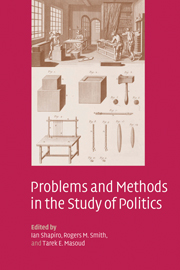Book contents
- Frontmatter
- Contents
- List of contributors
- Acknowledgments
- 1 Introduction: problems and methods in the study of politics
- Part I Description, explanation, and agency
- Part II Redeeming rational choice theory?
- 8 Lies, damned lies, and rational choice analyses
- 9 Problems and methods in political science: rational explanation and its limits
- 10 An analytic narrative approach to puzzles and problems
- 11 The methodical study of politics
- Part III Possibilities for pluralism and convergence
- Index
- References
9 - Problems and methods in political science: rational explanation and its limits
Published online by Cambridge University Press: 22 September 2009
- Frontmatter
- Contents
- List of contributors
- Acknowledgments
- 1 Introduction: problems and methods in the study of politics
- Part I Description, explanation, and agency
- Part II Redeeming rational choice theory?
- 8 Lies, damned lies, and rational choice analyses
- 9 Problems and methods in political science: rational explanation and its limits
- 10 An analytic narrative approach to puzzles and problems
- 11 The methodical study of politics
- Part III Possibilities for pluralism and convergence
- Index
- References
Summary
This chapter contains no novelties, no technicalities, no surprises, and almost no footnotes. It gives an airing to thoughts I have developed only in lectures on the philosophy of social science to undergraduate audiences, and in conversations with the late Martin Hollis, which never quite reached consensus (Hollis 1994). I begin with some truisms about explanation generally, and the connections between problems and methods. I then argue that it is impossible to start explaining human behavior except on a “rationalizing” basis, and explain why this accords no priority to so-called rational choice theory. That rationalizing explanation is only the beginning of explanation I explain by showing that there is (i) room for argument about the difference between an actor's professed reasons and his “real” reasons, and (ii) further room for argument about the conditions under which reasons will be causally efficacious or the reverse. Very often the rational explanation of action is not wrong but simply uninteresting in comparison with questions about how actors came to adopt the goals they did, and how they came to perceive the situation in which they are acting.in one way rather than another. I then take up very briefly the suggestion that rational actor explanation is improperly individualistic, and discuss its relationship to “holistic,” and “functionalist” explanation, as well as its relationship to historical narrative.
Information
- Type
- Chapter
- Information
- Problems and Methods in the Study of Politics , pp. 186 - 200Publisher: Cambridge University PressPrint publication year: 2004
